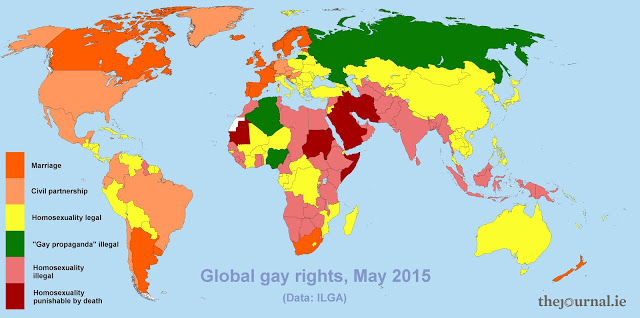仇视同性恋的 4 个原因

Table of contents
仇视同性恋的原因是什么?
See_also: 如何找到自己的目标(5 个简单步骤)为什么有些人会恐同?
恐同症的心理和生理驱动因素是什么?
本文将尝试回答这些问题。
仇视同性恋是一种普遍现象,自人类有史以来就一直存在。 它的范围很广,从对同性恋者持敌视态度到对他们采取暴力行为不等。
如下图所示,同性恋在世界上许多国家都是非法的/应受惩罚的:

如果同性恋者一直受到如此多的仇恨和反对,那么他们被异性恋者视为威胁也就在情理之中了。
本文将讨论仇视同性恋的可能原因:
1) 双性恋是生殖威胁
男性双性恋者对男性异性恋者构成了生殖威胁。 与女性不同,男性需要练习性技巧,而且他们练习得越多就越好。
男性双性恋者往往在很小的时候就能从男性和女性身上获得早熟的性经验,他们还可以练习与不同性格类型的人发生性关系,这使他们比缺乏这方面经验的异性恋男性更具优势。
此外,雄性对雌性的性内竞争本来就很激烈,而雄性双性恋只会加剧这种平均竞争,使单个异性恋雄性不得不通过更激烈的竞争来寻找配偶。
这也许就是为什么几乎所有仇视同性恋的暴力行为都是针对男性同性恋者的。 女同性恋者从未被正式定罪。 女同性恋者对异性恋女性的生殖威胁还不如男同性恋者对异性恋男性的威胁大。
2) 疾病风险
尽管双性恋男性比异性恋男性具有生殖优势,但他们感染梅毒和艾滋病等性传播疾病的风险更大。
众所周知,厌恶主要是一种疾病回避机制2。
然而,对同性恋活动感到厌恶或想象自己从事这种活动是一回事,但积极阻止他人从事这种活动则完全是另一回事。
在游牧民族的祖先中,恐同症也许不是什么大问题,因为他们过着小群体生活,传播疾病的风险较小,但随着人类发明农业并在河谷边大量定居,人口密度的增加带来了疾病传播风险的增加。
这为执行禁止同性恋活动的法律提供了依据,也解释了为什么今天禁止同性恋活动的大多数法律都可以追溯到人类文明的后农业时代。
3) 对男性的威胁
大多数异性恋男性都具有阳刚之气,阳刚之气会提高他们的伴侣价值,从而增加吸引伴侣的概率。 大量男同性恋都是女性化的,因此男性可以通过与女性化的男同性恋保持距离来重申自己的阳刚之气。
从这个角度看,恐同症可以被视为保护男性阳刚之气的一种极端方式。
康奈尔大学的一项研究发现,当男性感到自己的男子气概受到威胁时,他们会表现出更多仇视同性恋的态度,试图重新确立自己的男子气概。
4) 压抑的同性恋
你可能至少听说过这样一个案例:一个人强烈宣扬反对同性恋,但他自己却在同性恋行为中被当场抓获。
See_also: 我为什么这么粘人?"(9 大原因)这就是一个压抑自己同性恋倾向的人的例子,他们内心深处知道自己有同性恋倾向,但却无法接受或完全意识到这一点,这可能是由于出柜成为同性恋者所带来的耻辱感。
因此,他们与任何能让他们联想到自己潜在同性恋倾向的东西进行激烈的斗争,一有机会就诋毁和羞辱同性恋者。
一项研究表明,对同性有不被承认的吸引力,并且在禁止这种欲望的专制父母身边长大的人,仇视同性恋的心理更为明显。
此外,研究还表明,与其他异性恋男性相比,有同性恋恐惧症倾向的男性会更多地注视同性恋图像5 ,这些男性在受到男性同性恋刺激时,阴茎勃起甚至会增强6。
参考资料
- Baker, R. (2006). 精子战争:不忠、性冲突和其他卧室争斗 .Basic Books.
- Curtis, V., De Barra, M., & Aunger, R. (2011)。厌恶是疾病规避行为的适应系统。 伦敦皇家学会哲学论文集 B:生物科学 , 366 (1563), 389-401.
- 康奈尔大学(2005).男性在阳刚之气受到威胁时会过度补偿.ScienceDaily.2018 年 1 月 14 日从 www.sciencedaily.com/releases/2005/08/050803064454.htm 检索。
- Weinstein, N., Ryan, W. S., DeHaan, C. R., Przybylski, A. K., Legate, N., & Ryan, R. M. (2012). Parental autonomy support and discrepancies between implicit and explicit sexual identities: Dynamics of self-acceptance and defense. 人格与社会心理学杂志 , 102 (4), 815.
- Cheval, B.、Radel, R.、Grob, E.、Ghisletta, P.、Bianchi-Demicheli, F.、& Chanal, J. (2016)。 恐同症:对同性的冲动性吸引? 来自图片浏览任务中眼动数据的证据。 性医学杂志 , 13 (5), 825-834.
- Adams, H. E., Wright, L. W., & Lohr, B. A. (1996)。恐同症与同性恋唤起有关吗? 变态心理学杂志 , 105 (3), 440.

